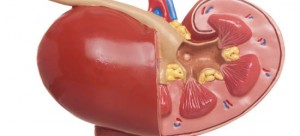
The Australian Institute of Health and Welfare (AIHW) released the report on kidney disease in Indigenous people on 16 September.
Chronic kidney disease is called “the silent killer” because 90 per cent of kidney function can be lost before symptoms appear.
What are the kidneys?
The kidneys are the body’s little battlers. They’re small – roughly the size of a clenched fist – but what they lack in size, they make up for in stamina.
According to Kidney Health Australia, when it comes to keeping us healthy and keeping us alive, kidneys are just as important as the heart.
What do the kidneys do?
The kidneys are responsible for a whole range of important bodily functions. They control blood pressure, produce red blood cells, remove waste and excess fluids from the body, balance out minerals and keep our bones strong and healthy. The kidneys filter roughly 200 litres of blood – that’s about 100 big bottles of milk – in just one day.
How do the kidneys work?
According to Kidney Health Australia, we can think of our kidneys as an “extremely sophisticated and environmentally friendly waste-disposal system, which sorts non-recyclable waste from recyclable waste 24 hours a day, 7 days a week.”
Waste is filtered out of the blood and removed from the body in the form of urine. The kidneys produce three essential hormones: erythropoietin, which is responsible for stimulating the production of red blood cells; renin, which helps in maintaining blood pressure levels; and active vitamin D, which keeps our bones healthy by regulating calcium uptake.
Maintaining kidney health
Our kidneys are resilient organs – they can continue to function with only 20 per cent of their normal working capacity. People can live a perfectly healthy life with only one functioning kidney.
Kidney disease is a serious and life-threatening illness, and about one-third of Australians are said to have, or be at risk of getting, kidney disease.
When left undetected, the damage caused is often irreversible. At this stage, treatment options are limited to a life-long program of repeated dialysis, where the blood is filtered out of the body and through a machine – or a kidney transplant. The good news is that kidney disease is largely preventable.
Healthy lifestyle = healthy kidneys
Maintaining a healthy lifestyle is the key to maintaining healthy kidneys. Obesity, smoking, excessive alcohol consumption, high cholesterol and high blood pressure can all put you at increased risk of developing kidney disease.
Managing these factors can reduce susceptibility to kidney disease, even among those with associated risk factors, such as a family history of kidney disease or diabetes.
Get more information
There are many programs available in your state and territory to help raise awareness about kidney disease across Australia. The Western Desert Kidney Health Project is one such organisation, aiming to reduce the incidence of kidney disease in Indigenous communities in the Western desert area of Western Australia.
Jump onto Australian IndigenousInfoNet at www.healthinfonet.ecu.edu.au and click on the ‘Programs and projects’ button (under Key Resources) to find more info or similar programs in your area.
For more information on kidney disease, treatment or how to keep your kidneys healthy, check out Kidney Health Australia’s website at www.kidney.org.au
Comments are closed.